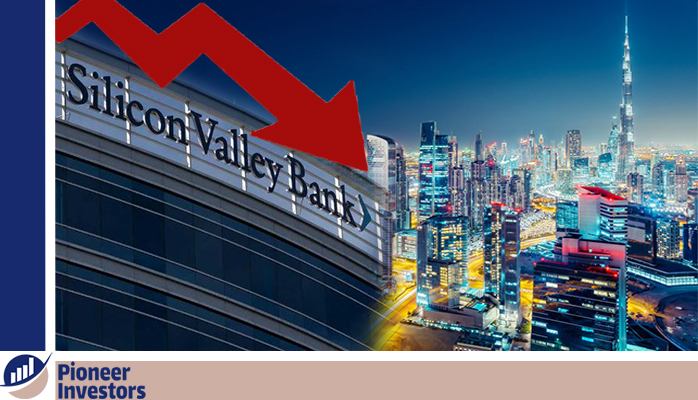“SVB” bankruptcy… Earthquake in America and tremors in the Middle East

“SVB” bankruptcy… Earthquake in America and tremors in the Middle East
Pioneer Investors– On the morning of March 10, 2023, depositors of Silicon Valley Bank, most of them were startups, woke up to the catastrophe of the bankruptcy of the bank that specialized in the banking business of tech startups, and the Federal Deposit Insurance Agency had placed it under “judicial receivership.” This means that the authorities have the right to confiscate the company’s assets to help creditors recover their money, and it was the biggest institutional failure faced by US financial authorities since the specter of the 2008 collapse of Lehman Brothers, which subsequently led to the global financial crisis.
This collapse led to a lot of fears and doubts in the global markets overnight, and many questions were raised about whether this collapse would affect the ability to raise funds for startups in the Middle East, as the US-based bank was a major source of financing. and the proliferation of technology startups, directly or indirectly.
The story of the bankruptcy
Before it collapsed like a rolling snowball in record time, Silicon Valley Bank, ranked 16th among the largest US banks in terms of budget size, with total assets of $209 billion, deposits exceeding $175 billion, and owns shares worth nearly $220 billion, but what happened was a wake-up call to the financing market.
Established in 1983, the bank has acted as a major lender to technology and start-up companies, providing services to venture capital firms around the world including in Egypt and the Middle East, and was the banking partner for nearly half of the technology and healthcare companies backed by US-listed companies last year.
At the beginning of 2020, the real bank crisis began with the US Federal Reserve raising interest rates continuously (8 times) over the past year to control inflation, as it became more expensive for startups to obtain financing, so they began withdrawing more money from their deposits in the bank to cover their expenses, which resulted in a financing gap and contributed to accelerating the pace of the crisis.
To bridge the gap, the bank was forced to sell its assets in long-term, low-interest bonds at unfair prices, which lost their attractiveness with the interest rate hike, so it suffered a loss, and later the bank surprised its investors with the need to raise $2.25 billion to meet the financing shortage.
The news caused a negative reaction from depositors and a wave of a rapid withdrawal of funds described as a “tsunami” that wiped out $80 billion of its value. Mystery increased with the bank’s CEO, Greg Baker, revealed in a message to depositors and investors that he sought to borrow $15 billion more than planned. him originally.
The reaction of investors and customers caused a record decline in the bank’s shares, and it witnessed its largest decline in one day, as it fell by more than 60% and then fell further, so the decision of the banking services regulators came to stop trading in the bank’s shares and seize deposits, and the regulatory authorities closed the bank to protect depositors’ money Uninsured, pending intervention to reduce risk.
For some startups, Silicon Valley Bank may be the only bank that will accept some companies due to the level of risk and regulatory requirements, which means according to analysts that the assumption that most startups work with multiple banks and contingencies is completely unrealistic.
Earthquake in America and tremors in the Middle East
The catastrophe of the Silicon Valley bank collapse is linked to the Middle East in several ways. For 3 decades, the bank has been one of the most preferred banking options for startups and the technology industry in the region, as there are societies that depend more than ever on technological innovation, as well as on Silicon Valley Bank. This is mainly due to the flexibility in many aspects that fit into the startup ecosystem.
MENA startups raised $760 million across 48 deals in February, up from 22 contracts worth $104 million in the previous month, and funding increased by 638% month-over-month and 103% year-on-year, according to the report, Data was collected by the “Wamda” investment fund a few days ago.
The sudden collapse of a Silicon Valley, California bank reverberated more than 7,000 miles away in the Middle East, as cash-strapped start-ups struggled to find a way to pay their staff and other operating expenses, and local lenders seized the opportunity to help bridge the gap, while regulators tried. Americans solve this mess.
But the collapse of the New York-based Signature Bank, which is active in real estate and is popular with startups, just two days after the collapse of the Silicon Valley bank, has complicated matters more and raised concerns about the fate of other banks favored by the technology industry, including California’s First Republic, whose share price fell 30% in two days, and the US Federal Deposit Insurance Corporation announced an emergency rescue program after hours, saying it would pay depositors 100% of the money they had in both banks.
It is expected that the collapse of the Silicon Valley Bank will put pressure on dozens of prominent local startups in the region, which were unable to access the stalled deposits in the bank, and this indicates in the future that any further financial turmoil in the United States would affect the economies of the Middle East and world.
For a lot of non-US startups, they don’t have many banking alternatives, the local banking system does not provide enough support and quality products for SMEs and startups, so companies in the Middle East may face more challenges than those in other emerging markets to open a bank account post quickly.
As for the real victims of the repercussions of the current collapse, they are startups that have 10 to 100 employees, who cannot pay their salaries, and they will have to go on compulsory leave or close and lay off employees as soon as possible, thus destroying an entire generation of startups within a month or two.
The rapid echoes of the failure of Silicon Valley Bank included the decline of many stock indices in the region, led by the Egyptian Stock Exchange, on the background of the news circulated, and according to market data, most of the major stock markets in the Gulf region closed lower, as investors showed caution, and oil prices fell, and The Central Kuwait bank expected little impact on local banks.
In the UAE, which promotes itself as a center for emerging technology companies, the consequences of the collapse were less severe, and Abu Dhabi bankers see positives in saving startups, but Mohammed Al Balushi, Head of Fintech Hive in the Dubai International Financial Center, which consists of more than 650 emerging companies in the field of financial technology, He did not hide the echoes of the collapse in the Gulf region, saying it was a “tough” time over the weekend.
And “Bloomberg” agency reported that the investment company of the “Royal Group”, owned by the Emirati National Security Adviser, Sheikh Tahnoon bin Zayed Al Nahyan, discussed the purchase of the British arm of Silicon Valley Bank, but did not make a final decision on the deal. Eventually the British arm of the Bank for £1.
However, with the cohesion of markets in the Middle East, it seems that this collapse will not lead to a real crisis for emerging companies in the Middle East, but it will be a wake-up call for many financial systems in the region.




